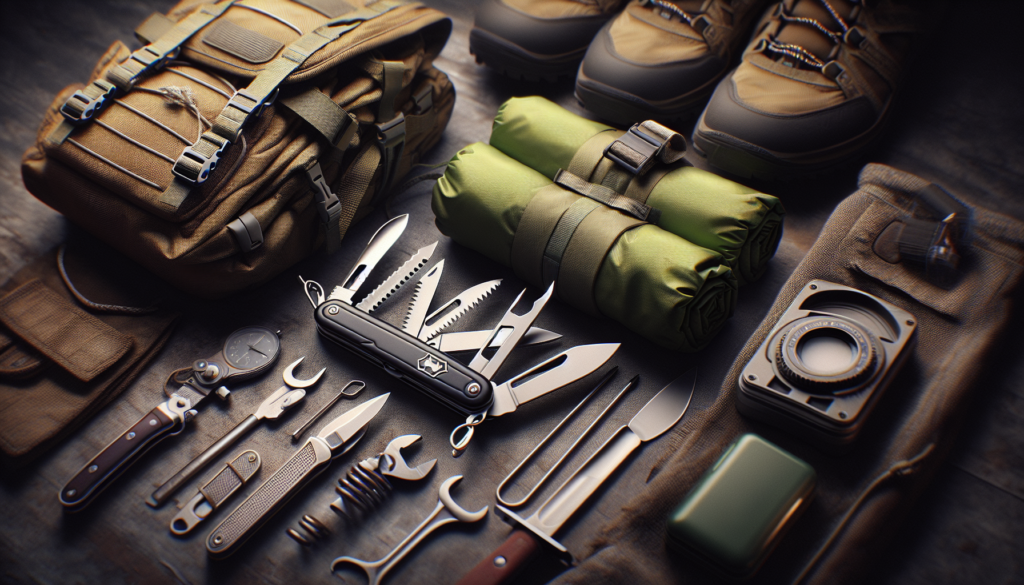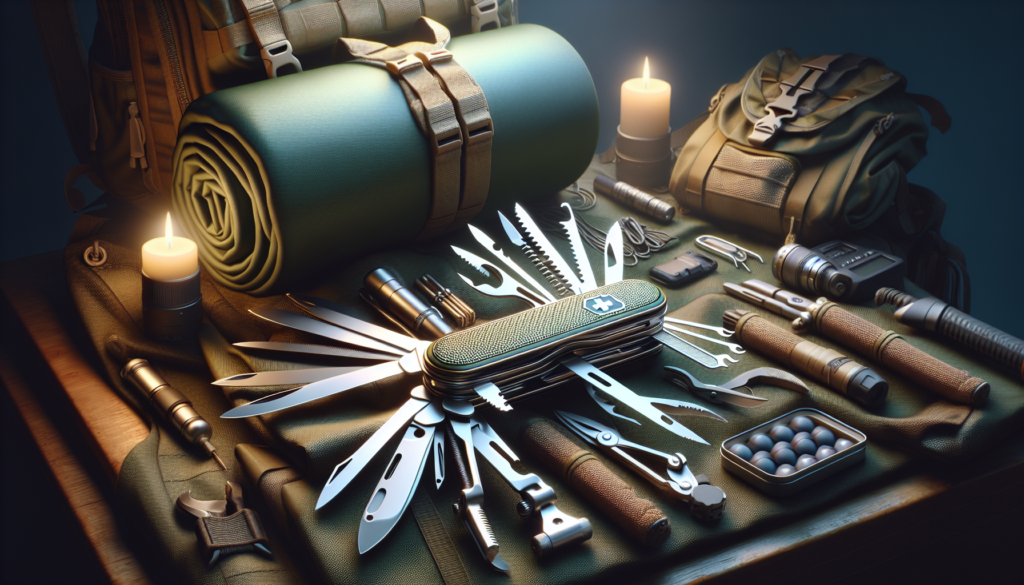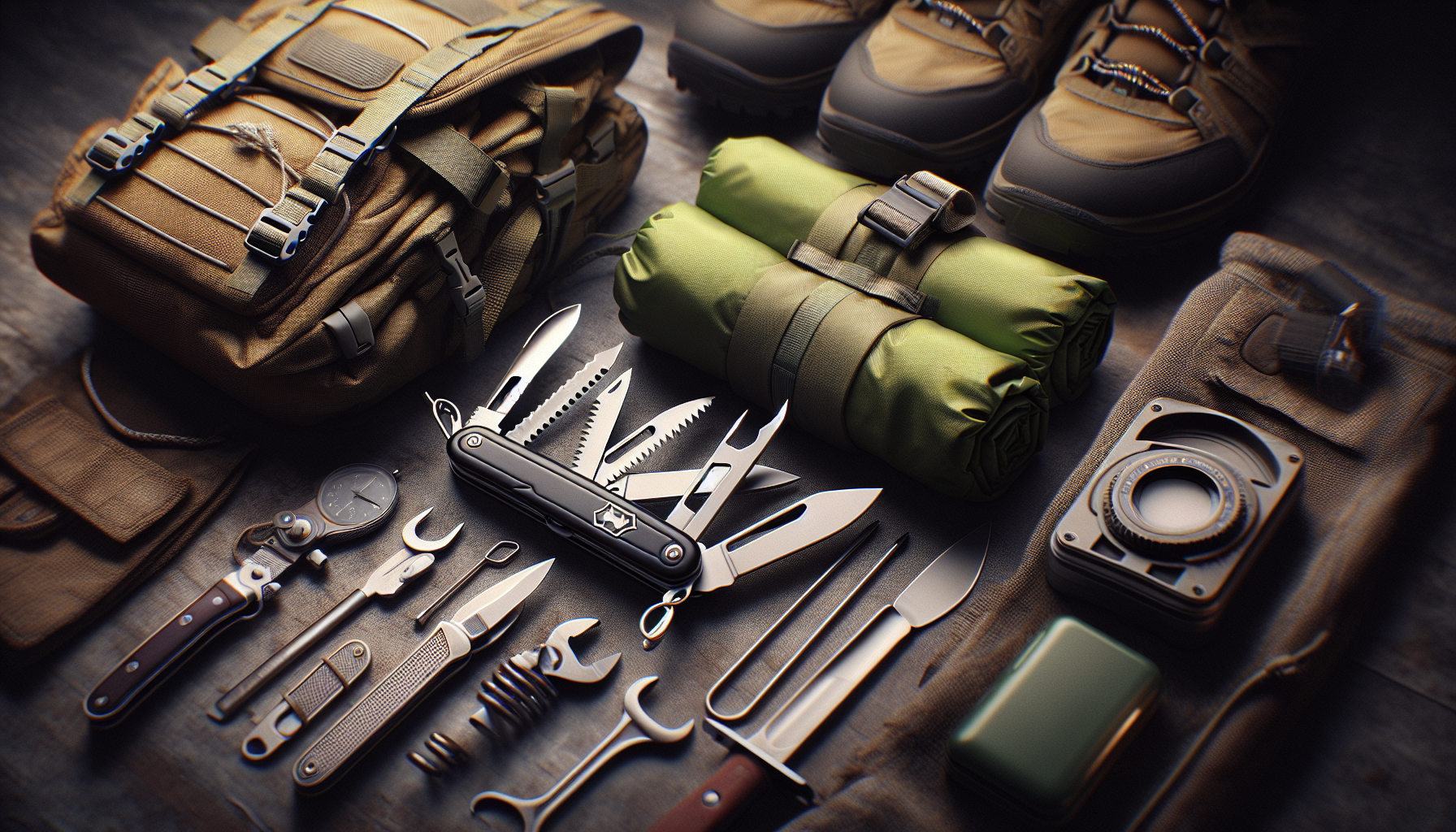So you’ve decided to embark on a thrilling camping adventure, but you’re not quite sure what to pack. Don’t fret! In this article, we’ll guide you through the must-have items for a basic camping trip. From sturdy tents to cozy sleeping bags and essential cooking utensils, we’ve got you covered. So grab your backpack and get ready to explore the great outdoors with confidence, knowing that you’re fully equipped for a memorable camping experience.
Shelter and Sleeping Gear
Tent or Shelter
When going on a camping trip, one of the most important items you’ll need is a tent or shelter. This will provide the much-needed protection and comfort during your outdoor adventure. Look for a tent that is spacious enough to accommodate the number of people in your group and offers good weather resistance. Consider the ease of setting up and the weight of the tent as well, especially if you plan on backpacking. If you prefer a more minimalist camping experience, you can also opt for a hammock or bivy sack as your shelter alternative.
Sleeping Bag
A sleeping bag is an essential item to ensure a good night’s sleep while camping. Look for one that is appropriate for the temperature range you’ll be camping in. Keep in mind that sleeping bags are often rated for different seasons, so choose one accordingly. If you’re camping in colder conditions, consider a mummy-style sleeping bag that provides better insulation and coverage. Synthetic sleeping bags are a great option if you expect wet weather, as they dry faster than down sleeping bags.
Sleeping Pad
To enhance your sleeping comfort, invest in a good sleeping pad. Sleeping directly on the ground can be uncomfortable and lead to a restless night’s sleep. Sleeping pads provide insulation and cushioning, making your camping experience much more pleasant. There are various types of sleeping pads available, such as self-inflating pads, air pads, and foam pads. Choose one that suits your preferences and provides sufficient insulation for the weather conditions you’ll face.
Pillow
Though often overlooked, a pillow can significantly improve your sleep quality while camping. Along with your sleeping bag and pad, a pillow will ensure that you wake up feeling refreshed and ready for a day of outdoor activities. There are specially designed camping pillows that are lightweight and compressible, making them easy to pack and carry. Alternatively, you can use a stuff sack filled with clothes as a makeshift pillow for extra convenience.
Extra Blanket or Sleeping Bag Liner
If you’re camping in colder temperatures or want an added layer of comfort, consider bringing an extra blanket or a sleeping bag liner. These can be used to provide additional warmth during chilly nights or serve as an extra layer between you and your sleeping bag for added cleanliness and comfort. Choose a lightweight and compact blanket or liner that won’t take up much space in your camping gear.
Cooking and Food Supplies
Stove and Fuel
Preparing and enjoying delicious meals in the great outdoors is an essential part of any camping trip. Invest in a reliable camping stove that suits your cooking needs. There are various options available, including compact backpacking stoves, two-burner stoves, and even portable grills. Ensure you have enough fuel for the duration of your trip, considering both cooking and potential emergencies.
Cookware Set
A versatile cookware set is crucial for cooking meals while camping. Look for lightweight and durable options that include a frying pan, saucepan, and pots of varying sizes. Non-stick coatings can be beneficial for easier cooking and cleaning. Additionally, consider nesting cookware sets that save space when packed.
Utensils
Don’t forget to pack essential utensils such as a knife, spatula, tongs, and a can opener. Opt for compact and lightweight options specifically designed for camping. Additionally, bring enough utensils for everyone in your group to ensure a hassle-free dining experience.
Plates, Bowls, and Mugs
Eating meals while camping requires proper dishes and mugs. Look for lightweight, shatter-resistant plates, bowls, and mugs that are specifically designed for outdoor use. Consider stackable options to save space in your camping gear.
Cooler or Food Storage Container
If you plan on bringing perishable food items, a cooler or food storage container is essential. Look for a cooler with sufficient insulation and capacity to store your food for the duration of your trip. Consider using ice packs or freeze water bottles to keep your food cold without the hassle of melting ice.
Food and Drinks
When it comes to camping food, opt for easy-to-prepare and non-perishable options. Meals that require minimal cooking or can be cooked over a campfire are ideal. Don’t forget to bring snacks, fruits, and plenty of water to stay hydrated throughout your camping adventure.
Water Filtration System
Access to clean drinking water is crucial during a camping trip. If you’ll be camping in an area without a reliable water source, consider investing in a water filtration system. There are various options available, such as water filters, purifiers, and water treatment tablets, which will ensure that you have safe drinking water throughout your trip.

Clothing
Moisture-wicking Underwear and Socks
When camping, it’s important to stay dry and comfortable, especially when engaging in outdoor activities. Opt for moisture-wicking underwear and socks that will help keep sweat away from your body, reducing the chances of discomfort, blisters, and chafing. Avoid cotton materials, as they tend to retain moisture and can leave you feeling cold and damp.
Comfortable Shoes or Hiking Boots
Having appropriate footwear is crucial to ensure comfort and safety while camping. Choose comfortable shoes or hiking boots that offer sufficient support and traction. Consider the type of terrain you’ll be exploring and select footwear accordingly. Make sure your shoes or boots are broken in before your camping trip to avoid potential blisters or foot pain.
Layered Clothing (including a Jacket)
Layering your clothing is essential for adapting to changing weather conditions while camping. Be prepared for varying temperatures by packing a range of clothing options. Start with a moisture-wicking base layer, followed by an insulating mid-layer, and top it off with a waterproof and windproof jacket. This way, you can easily adjust your clothing to stay comfortable throughout the day and night.
Rain Gear
Don’t let unexpected rain ruin your camping experience. Pack a reliable rain jacket and waterproof pants to stay dry. Look for materials that are both waterproof and breathable to ensure comfort during outdoor activities. Additionally, consider packing a compact and lightweight poncho for quick protection during sudden showers.
Hat and Sunglasses
Protecting yourself from the sun’s rays is essential while camping. Pack a wide-brimmed hat to shield your face and neck from direct sunlight. Sunglasses with UV protection are also important to protect your eyes from harmful rays. These items are especially crucial if you’ll be spending a lot of time outdoors during the daytime.
Extra Clothes and Towel
Having a spare set of clothes is always a good idea while camping. Pack extra underwear, socks, and t-shirts to ensure cleanliness and comfort throughout your trip. Don’t forget to bring a towel or quick-drying microfiber towel for showering or swimming in nearby bodies of water.
Personal Hygiene
Toothbrush and Toothpaste
Maintaining good oral hygiene is just as important while camping as it is at home. Pack a toothbrush and toothpaste to ensure fresh breath and a clean mouth. Look for travel-sized options to save space in your camping gear.
Soap and Shampoo
Camping doesn’t mean sacrificing personal hygiene. Bring travel-sized bottles of soap and shampoo to keep yourself clean and fresh. Opt for biodegradable options to minimize your impact on the environment.
Toilet Paper
Having toilet paper readily available is essential for a comfortable camping experience. Pack enough toilet paper for the duration of your trip, keeping in mind that it might be difficult to find in remote locations. Consider using a waterproof and compact dispenser to protect your toilet paper from moisture.
Hand Sanitizer
Maintaining proper hand hygiene is crucial while camping, especially when access to running water is limited. Pack a small bottle of hand sanitizer to keep your hands clean and germ-free. Use it before preparing food, eating, or after using communal facilities.
Towel
In addition to a towel for drying yourself after showering, consider packing a separate microfiber towel for wiping off sweat or drying camping gear. Microfiber towels are lightweight, quick-drying, and take up minimal space in your camping gear.
Sunscreen
Protecting your skin from the sun’s harmful UV rays is essential during outdoor activities. Choose a sunscreen with a high SPF and apply it generously to all exposed skin. Don’t forget to reapply regularly, especially if you’re sweating or swimming.
Insect Repellent
While camping, insects can be a constant annoyance. Protect yourself from mosquito bites and other annoying pests by packing insect repellent. Look for repellents containing ingredients such as DEET or picaridin to effectively ward off insects. Consider choosing options that are safe for the environment to minimize the impact on the ecosystem.

First Aid Kit
Bandages
A first aid kit is an absolute must-have for any camping trip. Make sure your kit includes a variety of bandages in different sizes to cover wounds and prevent infection. Include adhesive bandages, gauze pads, and medical tape.
Antiseptic Wipes
Antiseptic wipes are essential for cleaning wounds and preventing infection. Pack individually wrapped antiseptic wipes to ensure cleanliness and convenience while camping.
Gauze Pads
Gauze pads are necessary for covering larger wounds or applying pressure to control bleeding. Make sure your first aid kit includes gauze pads in various sizes.
Tweezers
Tweezers are handy for removing splinters, ticks, or other foreign objects from the skin. Pack a pair of tweezers with a fine-tip for precise removal.
Pain Relievers
Headaches, minor aches, or pains are not uncommon while camping. Include pain relievers such as acetaminophen or ibuprofen in your first aid kit for quick relief.
Medications
If you take any regular medications, ensure you have an ample supply for the duration of your camping trip. Pack them in a waterproof container and keep them easily accessible.
Emergency Contact Information
Having emergency contact information readily available is crucial. Include emergency phone numbers, information about your health insurance, and details of any pre-existing medical conditions or allergies. Store this information in a waterproof container along with your first aid kit.
Lighting and Fire Supplies
Headlamp or Flashlight
A reliable source of light is essential during your camping trip, especially at night. A headlamp or flashlight will provide a hands-free lighting option for activities such as cooking, navigating in the dark, or even reading. Make sure to pack extra batteries or a rechargeable power source to ensure continuous lighting.
Extra Batteries
Ensure you have spare batteries for your headlamp or flashlight. It’s always better to be prepared, especially when a reliable source of light is crucial.
Matches or Lighter
Fire can provide warmth, light, and the opportunity to cook while camping. Make sure to pack waterproof matches or a reliable lighter in your camping gear. Store them in a waterproof container to keep them dry and functional.
Firewood or Fire Starters
If you plan on having campfires, ensure you have enough firewood or fire starters to keep it going. Check the regulations of the campsite regarding firewood collection and usage. If firewood is not available or restricted, bring fire starters such as newspaper, kindling, or commercially available fire starters.
Navigation and Communication
Map and Compass
Even with modern technology, having a physical map and compass is important for navigating while camping. Familiarize yourself with the area you’ll be camping in and plan your routes beforehand. Maps and compasses can be invaluable if you encounter unexpected situations where digital devices fail.
GPS Device
A GPS device can be a valuable tool for navigation while camping. Look for a handheld GPS device that is specifically designed for outdoor use. Check for features like topographic maps, waypoint marking, and tracking to enhance your navigation capabilities.
Cell Phone and Charger
Though you may want to disconnect from technology during your camping trip, bringing your cell phone is essential for emergencies. Ensure your phone is fully charged and pack a portable charger or solar charger to keep it powered throughout your trip. Remember to conserve battery life to ensure you have means of communication during emergencies.
Whistle
A whistle is a useful tool for attracting attention during emergencies. Attach it to your backpack or clothing for easy access. Three short blasts on a whistle are internationally recognized as a distress signal.
Emergency Signal Mirror
An emergency signal mirror can be a lifesaver in case you get lost or need to communicate with rescuers. The reflective surface can be used to signal for help by reflecting sunlight. Pack a lightweight and compact signal mirror in your camping gear.
Tools and Repair Kits
Knife or Multi-tool
A versatile tool like a knife or multi-tool is essential for various camping tasks. From cutting rope to preparing food, a knife or multi-tool is a must-have item. Opt for a quality and durable option that includes features such as a blade, screwdriver, can opener, and pliers.
Duct Tape
Duct tape is the go-to solution for many camping repairs. From tent repairs to fixing gear, duct tape can be a handy tool in unexpected situations. Pack a small roll or wrap some around a pencil to save space in your camping gear.
Rope or Paracord
Having a rope or paracord is essential for various camping needs. Use it for securing your shelter, hanging food away from wildlife, or even creating a clothesline. Choose a durable and lightweight option suitable for your specific camping activities.
Repair Kit for Tent or Sleeping Pad
Accidents happen, and it’s always better to be prepared. Pack a repair kit specifically designed for your tent or sleeping pad. It should include patches, adhesives, and tools necessary for patching up minor damages.
Extra Tent Stakes
Tent stakes are easy to lose or bend, so it’s wise to have some extras on hand. Pack a few extra tent stakes to replace any that may go missing or become damaged during your camping trip.
Entertainment and Comfort
Camp Chairs or Stools
After a day of outdoor activities, it’s nice to have a comfortable place to relax around the campfire. Pack portable folding camp chairs or stools for comfortable seating. Look for lightweight and compact options that are easy to transport.
Camp Table
A camp table provides a convenient surface for cooking, eating, or playing games. Look for folding camp tables that are lightweight and compact for easy transportation. Consider the size and height to ensure it suits your specific camping needs.
Games or Cards
Enhance the enjoyment of your camping trip with games or a deck of cards. These simple forms of entertainment can be a great way to bond with friends and family while spending time in the great outdoors.
Book or E-reader
If you enjoy reading, bring along a book or e-reader to relax with during your camping trip. Unplug from technology and immerse yourself in a good story or informational book.
Portable Speaker or Radio
If you enjoy listening to music or want to stay updated with the latest news while camping, consider packing a portable speaker or a camping radio. Look for options that are waterproof and have good battery life. Be mindful of other campers and follow campsite guidelines regarding noise levels.
Safety and Security
Fire Extinguisher
Having a fire extinguisher in your camping gear adds an extra layer of safety in case of emergencies. Look for compact and lightweight fire extinguishers specifically designed for outdoor use. Familiarize yourself with its usage and keep it easily accessible.
Bear Spray or Bear-proof Container
Depending on the area you’ll be camping in, encounters with bears or other wildlife may be a possibility. In such cases, bear spray or a bear-proof container can help ensure your safety and protect your food from being accessed by animals. Familiarize yourself with proper usage and storage guidelines.
Pocket Knife
A pocket knife can be a versatile tool for camping and also serve as a safety measure. Choose a pocket knife that suits your needs and ensure it is kept in a secure and easily accessible location.
Rain Poncho
Unexpected rain can dampen the mood during a camping trip. Pack a lightweight and compact rain poncho to stay dry during sudden showers. Look for options that are breathable and have a hood for added protection.
Personal Locator Beacon or Satellite Messenger
If you’re going on an adventurous camping trip in remote areas, consider bringing a personal locator beacon (PLB) or a satellite messenger. These devices can be useful in case of emergencies where you need to alert emergency services or communicate your location.
Camping is a wonderful way to connect with nature and enjoy the great outdoors. By being well-prepared and packing the essential items listed above, you can ensure a comfortable and enjoyable camping experience. Don’t forget to tailor your packing list to the specific needs and requirements of your camping trip. Stay safe, have fun, and create lasting memories on your next camping adventure!
